The Homemade Wine Talk [1]
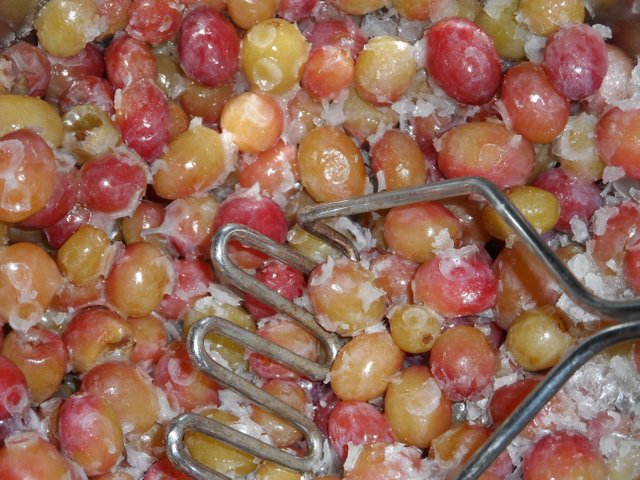
Last October, we harvested too many grapes. So. We froze some of them to make ice wine. The grapes were collected from various locations around town, where the grapes are usually left to rot on the vines. A local helped us find abandoned vines.
I put some of the frozen grapes into a big pot and used a potato masher to mash them.
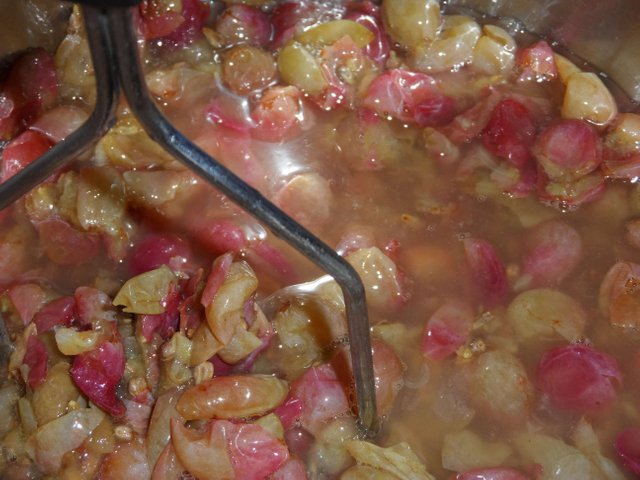
Used an old plastic 8 liter water bottle for the fermenting bottle. And, chopped off the top of a 1.5 liter soda bottle to make the funnel.
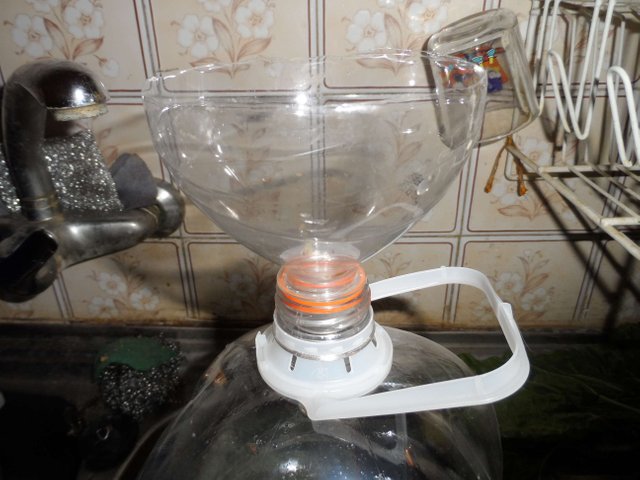
Poured off the excess liquids and mash (it'll all go in the fermenter). Used a little spoon to shove the mashed grapes through the funnel.
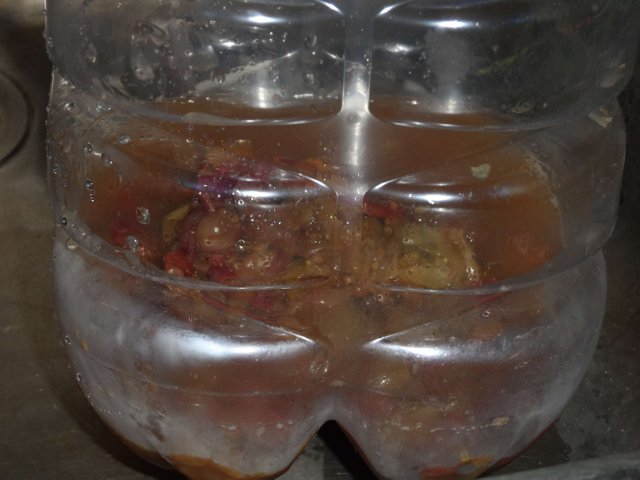
That was Round 1. You're hand mashing. So. Keep mashing!
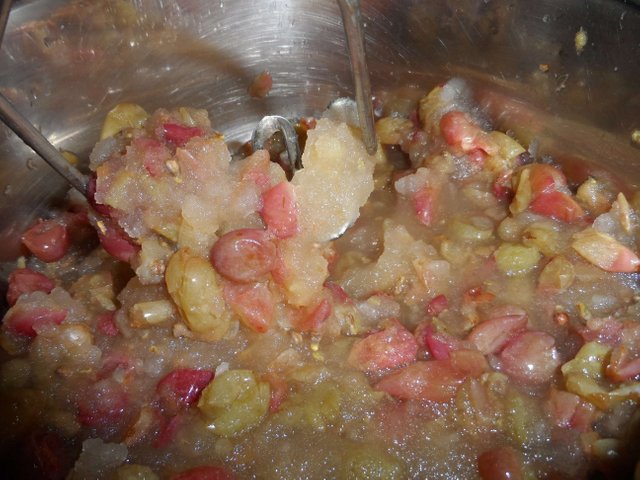
After my bottle was filled with frozen mashed grapes, I used a folded over piece of tape (secured in place by rubber band) to cover the top. The piece of tape was stabbed multiple times to allow the wine to breath and to let the natural yeast enter.
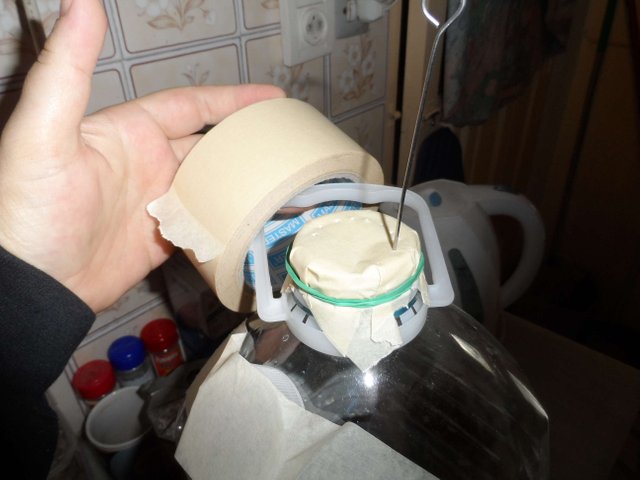
After that I used a sharpie to put the pertinent information on the side of the bottle. I taped the actual lid to the side of the bottle (for use at daily stirring), and then I put the fermenter in a dark corner of the pantry. Every day for the next two weeks, I'll put the cap on the bottle and give it a good shake. At the end of two weeks, I'll drain and filter the juice from the grape mash. The filtered juice will be put into another sterilized old water bottle. I'll repeat the process at least three times before I bottle the wine.
Come back later to find out if this Dude made homemade wine or vinegar!
Take it easy, Dudes
Follow me on Twitter: @cosmo_crator
coming from a family that has vinyards, i have to ask.... if those grapes were on the vine at time of harvest? if so the grapes will already have the necessary yeast on their exterior skins for the fermentation process. there is no need to aerate the mash to allow for yeast. i do know that shortly after the fermentation process begins, if you do not create an airlock you will most certainly make vinegar, or at best make a very acidic poor tasting wine lol... oxidation of the wine is what causes it to become vinegar. i am however interested in seeing the end product.
Hey @misterd21 thanks for the heads up. I'm not from a family with vineyards. I am teaching myself from the net and locals. So, I'm always glad to get advice from someone else with experience. I'll have to reevaluate the process. I've read up on some folks using a balloon. You think, I should just cap it?
No, i think it would be better to visit a brewers shop, or check online for a airlock or vaporlock. they're pretty cheap, maybe like 2-3 bucks.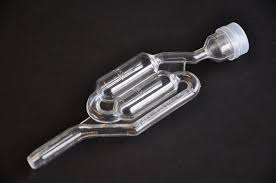 and a cork for your bung...
and a cork for your bung... they come in different sizes for the opening of your fermenter. With wine, or any fermentation really... keeping the air out is essential to not making vinegar. i would also suggest after 4-5 days that you "rack" the wine into another fermenter or settling container again under airlock, to allow the yeast, and sediments to settle to the bottom of the container for another two weeks, and then again for another week in another container again under airlock. "racking" the wine does a few things. it allows the wine brief periods to breathe, and it aids in removing any solids in the wine. As a home brewer you are always going to have a very fine amount of sediment as you bottle and age the wine, this is normal. Wineries buy filtering machines so they can remove the solids, but it is normal for homemade wine and beers to have a small amount of sediment collect on the cork, or bottom of the bottles depending upon how you store your wine. After you're done bottling the wine, store it in a cool somewhat dim area to age. I would suggest that you allow the wine to age for a minimum of 6 months. As "green" wine can have a rough taste, and will mellow the longer you allow it to age. aging will also bring out subtle notes of different flavors of the grape. as each grape is usually ever so slightly different from one vine to the next in sugar content, trace minerals, and ripeness. the longer you let it age the more subtle flavors will emerge in the flavor of the wine. good luck and, please let me know how it turns out.
they come in different sizes for the opening of your fermenter. With wine, or any fermentation really... keeping the air out is essential to not making vinegar. i would also suggest after 4-5 days that you "rack" the wine into another fermenter or settling container again under airlock, to allow the yeast, and sediments to settle to the bottom of the container for another two weeks, and then again for another week in another container again under airlock. "racking" the wine does a few things. it allows the wine brief periods to breathe, and it aids in removing any solids in the wine. As a home brewer you are always going to have a very fine amount of sediment as you bottle and age the wine, this is normal. Wineries buy filtering machines so they can remove the solids, but it is normal for homemade wine and beers to have a small amount of sediment collect on the cork, or bottom of the bottles depending upon how you store your wine. After you're done bottling the wine, store it in a cool somewhat dim area to age. I would suggest that you allow the wine to age for a minimum of 6 months. As "green" wine can have a rough taste, and will mellow the longer you allow it to age. aging will also bring out subtle notes of different flavors of the grape. as each grape is usually ever so slightly different from one vine to the next in sugar content, trace minerals, and ripeness. the longer you let it age the more subtle flavors will emerge in the flavor of the wine. good luck and, please let me know how it turns out.
Hey thanks! I'll have to see if I can find something like that around here. Part of my goal is to use all re-purposed materials. I'll have to see what I can come up with. The next post will reflect some changes based on your advice. While vinegar is important, my ultimate goal is wine. So, I appreciate the tips.